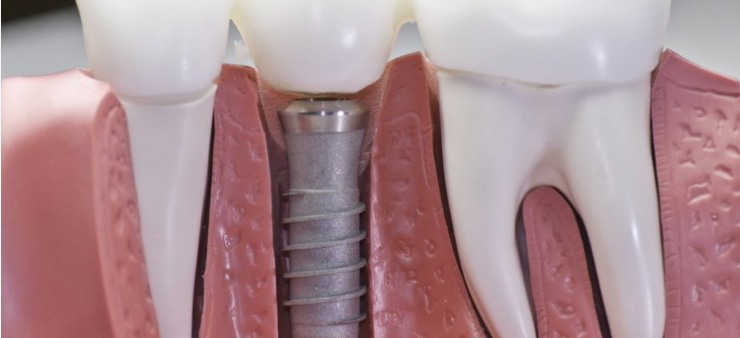
Dental implant failure: causes, prevention, and treatment options
January 8, 2023
If you have a lost tooth and are looking for a natural, fixed tooth replacement, dental implants could be a great option for you. Dental implants include surgically placing an metal implant (to replace the tooth root) in the jaw bone. Once healed a crown is attached to the implant to give you a fully functional tooth replacement. While dental implants are arguably the best option for replacing missing teeth, they of course don’t come without risks or complications. So, if you’re thinking ‘I need dental implants’, have a read of the information below so you can decide whether dental implants are the best tooth replacement option for you.
Implant complications and failures
Firstly let’s tackle that all important success rate of dental implants. Dental implants require a lot of screening before treatment to ensure your safety during the implant surgery and the success of implant placement. During the screening process, X-rays and a CT scan will be taken to assess the density of your bone in the area of desired implant placement. Your dentist will also discuss your medical history in length to make sure your body will be tolerant to the implant. Taking this into account, the success rate of dental implants is pretty high, for most dentists it’s around 95%. For those whose first implant fails, many dentists will place a second implant successfully. While the chance is small there is always the risk that implant complications leading to implant failure are possible.
Now, for possible implant complications
As we discussed earlier, implant complications don’t often occur, but you should be aware of some of the possible complications when starting your dental implant treatment.
1. Infection.
Unfortunately infection can occur and this typically happens to those that do not follow their post operative care instructions. Antibiotics are usually given for your use after implant surgery has been completed to give you protection against possible infection.
2.The bone is not healing around the implant.
While in most cases the bone quickly heals around the implant giving it great stability, for a small number of people this is not the case. While this is undesired, there are options to help stabilise the implant.
- Nerve damage.
One of the biggest risks of tooth implants is nerve damage, the risk of this is reduced dramatically by visiting a dental implants specialist. - Gum disease.
Gum disease can be a complication of implants, but this is predominantly an issue for those who had gum disease prior to dental implant placement. Although this may be a concern, your dentist can take special considerations in your aftercare if you have previously suffered from gum disease to ensure your implants are successful.
While there are always risks when opting for any medical procedures, the risks are pretty low when opting for dental implants, however complications of dental implants in the elderly are more common than younger patients. Do not fear though, your dentist will discuss all of your options as well as the risks with you to ensure you’re making the correct choice for you.
Introduction:
As we age, our teeth naturally undergo various changes, which can impact the appearance and health of our smiles. Cosmetic dentistry plays a vital role in addressing these age-related issues and restoring confidence in our smiles.
Key Concepts:
Understanding Age-Related Changes:
Teeth naturally darken and yellow with age due to factors like enamel thinning and staining.
Wear and tear over time can lead to chipped or cracked teeth.
Tooth loss becomes more common as we get older, leading to gaps and shifting of surrounding teeth.
Cosmetic Dentistry Procedures for Aging Teeth:
Teeth Whitening: Professional teeth whitening treatments can effectively reverse the effects of staining and discoloration.
Dental Veneers: Thin porcelain or composite shells can be used to cover imperfections like chips, stains, and gaps.
Dental Implants: For missing teeth, dental implants provide a natural-looking and functional solution.
Orthodontics: Braces or clear aligners can correct misaligned teeth, improving both function and appearance.
Tooth Bonding: A resin material is applied to chipped or cracked teeth and then shaped and polished to restore their appearance.
Gum Contouring: This can reshape the gumline, improving the symmetry and aesthetics of the smile.
Benefits of Cosmetic Dentistry for Aging Teeth:
Restored confidence: Improving the appearance of your smile can boost self-esteem and confidence.
Enhanced functionality: Many cosmetic procedures also improve the function of your teeth, making eating and speaking easier.
Preventing further damage: Addressing issues like chipped or cracked teeth can prevent further deterioration.
Choosing the Right Cosmetic Dentist:
Look for a qualified and experienced cosmetic dentist who specializes in the procedures you need.
Read patient reviews and ask for before-and-after photos to gauge their skill and results.
Consultation: Schedule an initial consultation to discuss your concerns and treatment options.
Aftercare and Maintenance:
Following cosmetic procedures, it’s essential to maintain good oral hygiene and visit your dentist regularly for check-ups.
Some treatments, like teeth whitening, may require periodic touch-ups to maintain their effects.
Conclusion:
Cosmetic dentistry offers a range of solutions to address age-related changes in your smile, helping you regain your confidence and achieve a more youthful appearance.
If you discuss your options with your dentist and they suggest the risks are too high for you to opt for dental implants there are some alternative options to replace missing teeth. You will be able to look at fixed and removable options as an alternative. Some alternative options to dental implants include: dentures or a dental bridge.
How can you prevent the complications of implants?
If you’ve invested in having dental implants you’re going to want to know how to minimise the dental implants complications that may occur without proper aftercare. While your dentist will give you a lengthy set of instructions for post operative care, we’re going to give you some of the main things you need to know.
- Avoid chewing on the site of the dental implant.
To avoid unnecessary pressure on the site of the implant we suggest to avoid chewing on the site. While healing is different for everyone, leaving the implant site alone for a few days is generally a good idea.
- Do not use a straw or create suction in the mouth.
Using a straw or spitting creates a pressure in the mouth that can disrupt the implant site and dislodge the clotting. - Avoid intense physical activity.
This may be a great excuse… but it’s wise to avoid intense exercise for the first two to three days after your dental implant is placed.
- Rinse the mouth with lukewarm saline water.
This is advised every two to three hours and will help the wound heal faster. - Use an ice pack.
Using an ice pack can reduce the swelling of the dental implant site. An icepack should be used for the first 24 hours every 20 minutes for 10-15 minutes at a time. Dental implants are a surgical procedure and therefore some swelling can be expected, swelling usually peaks 48 hours after dental implant surgery. - Stop smoking.
If you’re a smoker it’s essential you do not smoke for three to four days after having dental implants. Smoking can drastically reduce the healing potential in the mouth. - Avoid examining the site.
While your first instinct after having dental implants may be to prod the site with your tongue, it’s key you avoid doing so.
- A soft diet.
It’s important you opt for a soft diet, especially for the first week. Not only will it help with the healing of your dental implants but it will also reduce any pain or discomfort you experience when eating.
We hope this has helped you to understand more about the dental implant health risks associated with tooth replacement. If dental implants is a treatment you’re considering we suggest booking a consultation with one of our recommended dentists who can assist you in your decision. While you may want to opt for ‘cheap dental implants’ we urge you to do your research on the dentist you’re trusting as opting for a reputable dentist will reduce your risk of dental implants complications. So while searching for affordable dental implants make sure your oral care is not compromised.
Want to check out our providers of dental implants? Click the link below!
https://smilecircle.com/dentists
Here Are Some Relevant Pieces You Can Read About Dental Implants
- How Long Does A Dental Implant Procedure Take
- Are Full Mouth Dental Implants A Good Idea
- Do All On Four Dental Implants Look Natural
- Which Is Better All On Four Or All On Six Dental Implants
- why dental implants are the best solution for replacing missing teeth
- why dental implants are your best choice for missing teeth
- dental implants the ultimate solution for missing teeth and improved jaw health
- all on 6 vs all on 4 dental implants the full faq guide
- Which Foods Should You Eat After Dental Implant Surgery
If you are interested in Dental Implant in Poole, Andover Hampshire and Southampton, Sandbanks UK, Contact us or Book an Appointment.

 Head Office - UK - Unit 1 B 132 Weyhill Road, Andover, Hampshire England, SP10 2PR.
Head Office - UK - Unit 1 B 132 Weyhill Road, Andover, Hampshire England, SP10 2PR. 








